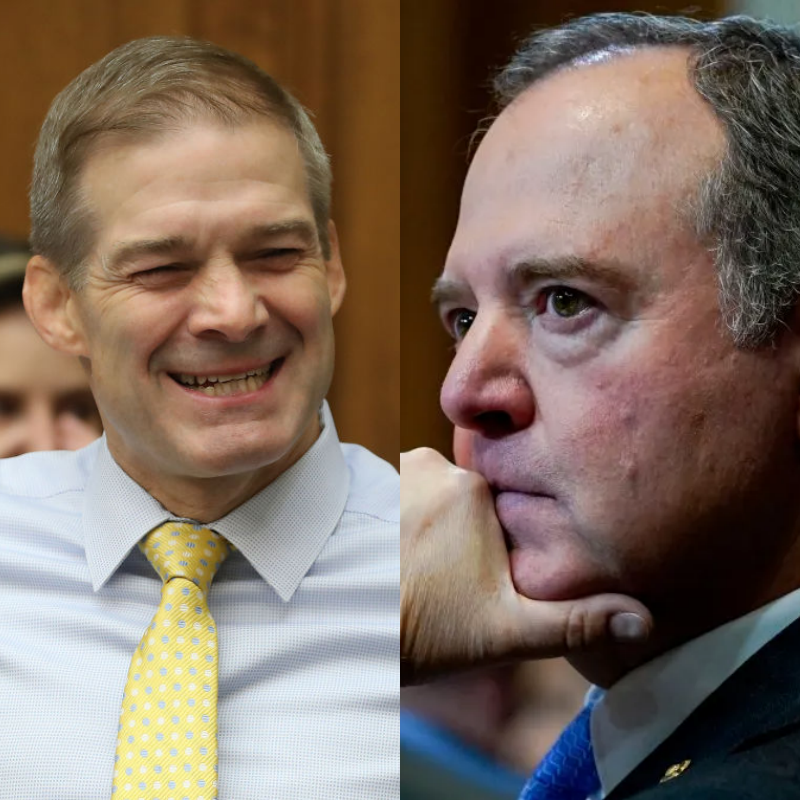Jim Jordan Unveils Bombshell Evidence That Obliterates Adam Schiff, Leaving Democrats Speechless!
Jim Jordan Unveils Damning Evidence Against Adam Schiff, Leaving Democrats in Shock
In a dramatic hearing that has sent shockwaves through Washington, Representative Jim Jordan presented explosive evidence that could potentially dismantle the credibility of key Democratic figures, particularly Adam Schiff. The session, focused on FBI oversight, quickly escalated into a powerful confrontation as Jordan and former aide Cash Patel revealed a web of corruption, political manipulation, and cover-ups within the intelligence community. This article delves into the details of the hearing, the evidence presented, and the implications for those involved.

The Opening Statement
The hearing commenced with Jordan outlining the significant findings brought to light by Director Patel. He emphasized the shocking revelation that Adam Schiff, the former chair of the House Intelligence Committee and now a U.S. senator, had allegedly leaked classified information. This accusation stemmed from a whistleblower with 23 years of experience in the intelligence community, who claimed they were pressured to leak false information aimed at undermining then-President Donald Trump.
“Why would the head of the intelligence committee, who is supposed to protect our nation’s secrets, encourage the leaking of classified information?” Jordan asked, setting the stage for a deep dive into the alleged misconduct.
Whistleblower Testimony
The whistleblower’s testimony was pivotal, stating that the leaked information was intended to be used to indict Trump. This assertion raised serious questions about the integrity of Schiff’s actions and the motivations behind them. Jordan underscored the gravity of the situation, suggesting that instead of safeguarding national secrets, Schiff had used his position to further a political agenda.
The hearing took a more intense turn as Jordan shifted focus to former FBI Director James Comey. He referenced the Inspector General’s report, which confirmed that Comey had violated FBI policy by disclosing classified information. “Comey’s motive was the same as Schiff’s: to sabotage Trump’s presidency,” Jordan asserted.
The Role of James Comey
Jordan accused Comey of being part of a broader conspiracy to undermine Trump’s administration. He recounted Comey’s admissions about his objectives, which were not only to investigate but also to influence the political landscape during Trump’s first term. The evidence presented suggested a coordinated effort among top intelligence officials, including John Brennan and Jim Clapper, to rewrite assessments regarding Russian interference in the 2016 election.
In a particularly striking email exchange, Admiral Rogers, the head of the NSA, expressed concerns about the integrity of the intelligence assessments being pushed by his colleagues. His apprehensions were dismissed in a reply from Clapper, who insisted on maintaining a unified front, stating, “It is essential that we be on the same page and are supportive.” This exchange highlighted the pressure to conform to a narrative that was politically motivated rather than factually accurate.

The Manipulation of Intelligence
The heart of Jordan’s argument lay in the assertion that the intelligence community had manipulated information to create a false narrative about Russian interference in the election. He pointed to a meeting that took place in December 2016, where officials decided to alter the assessment that initially indicated Russia did not impact the election vote count. Instead, they crafted a new narrative claiming that Russia had indeed influenced the election, which was subsequently published in January 2017.
This alteration of facts, Jordan argued, was part of a calculated strategy to undermine Trump from the very beginning of his presidency. He emphasized that the discredited Steele dossier, funded by the Clinton campaign, was central to this effort. Despite being aware of its dubious origins, intelligence officials used the dossier to brief Trump and leaked its contents to the media, igniting the Russia investigation.
Cash Patel’s Revelations
Cash Patel, who served as a key aide during the Trump administration, received significant praise during the hearing for his role in exposing these corrupt practices. He had spearheaded a strike force that investigated potential crimes related to the misuse of intelligence. His efforts led to the removal of 21,000 violent criminals from the streets, the rescue of 4,000 children, and the arrest of 1,300 predators.
Patel’s testimony also revealed shocking details about the FBI’s handling of informants during the January 6 Capitol riots. He disclosed that 26 informants were present inside the Capitol that day, yet none faced charges, contrasting sharply with the treatment of regular citizens involved in the protests. This discrepancy raised serious questions about the FBI’s priorities and the political motivations behind their actions.
Accountability for Intelligence Leaders
The hearing did not spare FBI Director Christopher Wray from scrutiny. Patel presented evidence that Wray had withheld critical information from Congress regarding the FBI’s surveillance of various groups, including Catholics. He accused Wray of misleading lawmakers and downplaying significant issues within the agency.
Throughout the hearing, it became increasingly clear that Jordan and Patel were committed to exposing what they described as a corrupt system within the intelligence community. They argued that Schiff, Comey, and Wray had weaponized their positions for political gain, undermining the integrity of the institutions they were meant to protect.

The Aftermath and Implications
As the hearing concluded, the implications of the evidence presented were profound. Jordan and Patel’s assertions raised critical questions about accountability within the intelligence community and the need for reforms to prevent such abuses of power in the future. The fallout from these revelations could have lasting effects on the reputations and careers of those implicated.
The hearing marked a significant moment in the ongoing battle between congressional Republicans and Democrats over the narrative surrounding the Trump administration and the investigations that followed. It underscored the deep divisions in American politics and the lengths to which individuals and parties might go to protect their interests.
Conclusion: A Call for Accountability
In the wake of the hearing, the question remains: Should Adam Schiff, James Comey, and Christopher Wray be held accountable for their actions? The evidence presented by Jim Jordan and Cash Patel suggests a troubling pattern of behavior that warrants further investigation. As the political landscape continues to evolve, the call for transparency and accountability within the intelligence community has never been more urgent.
This hearing not only highlighted the need for reform but also served as a rallying cry for those advocating for integrity in government. The American public deserves to know the truth, and as Jordan and Patel fight to expose it, the stakes have never been higher. The fallout from these revelations will undoubtedly shape the future of American politics and the trust citizens place in their government institutions.
Pam Bondi DESTROYS Amy Klobuchar on LAW and She Goes CRAZY!

Pam Bondi vs. Amy Klobuchar: A Fiery Clash Over Law and Order
In a heated exchange that captivated audiences, former Florida Attorney General Pam Bondi went head-to-head with Senator Amy Klobuchar, delivering a powerful critique that left Klobuchar visibly shaken. The debate, which centered on law and order, showcased Bondi’s sharp legal acumen and her ability to challenge Klobuchar’s positions with precision.

The confrontation unfolded during a recent televised forum, where both women were invited to discuss their views on criminal justice reform and public safety. Bondi, known for her tough stance on crime, seized the opportunity to question Klobuchar’s record as a prosecutor in Minnesota, highlighting what she described as inconsistencies and failures in her approach to law enforcement.
“Your track record speaks for itself,” Bondi asserted, her voice steady and confident. “As a prosecutor, you had the chance to make a real impact, yet crime rates continued to rise under your watch. How can you claim to be a champion of public safety when your own record tells a different story?”
Klobuchar, initially composed, appeared taken aback by the intensity of Bondi’s remarks. She attempted to defend her record, emphasizing her commitment to reform and community safety. However, Bondi pressed on, pointing out specific cases and statistics that painted a stark picture of Klobuchar’s tenure.
The tension escalated as Klobuchar’s frustration became evident. “I have always prioritized justice and accountability,” she replied, her tone rising. “We need to focus on solutions, not just point fingers!”
Bondi, undeterred, retorted, “Solutions start with accountability, Amy. If we don’t acknowledge the failures, how can we expect to move forward? The people of Minnesota deserve better!”
As the debate continued, viewers could sense the palpable energy in the room. Bondi’s assertive style contrasted sharply with Klobuchar’s increasingly defensive posture, creating a dynamic that kept audiences on the edge of their seats.
The exchange not only highlighted the differences in their political philosophies but also underscored the broader national conversation about law enforcement and criminal justice reform. Bondi’s ability to dismantle Klobuchar’s arguments resonated with many viewers, sparking discussions on social media about the effectiveness of their respective approaches to public safety.
In the end, the fiery clash left a lasting impression, with Bondi emerging as a formidable opponent who effectively challenged Klobuchar’s record. As the debate concluded, it was clear that this confrontation would be remembered as a defining moment in the ongoing dialogue about law and order in America.





